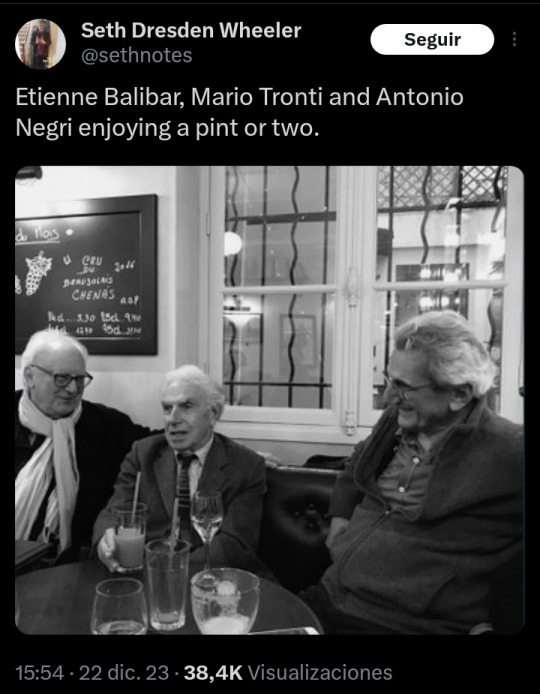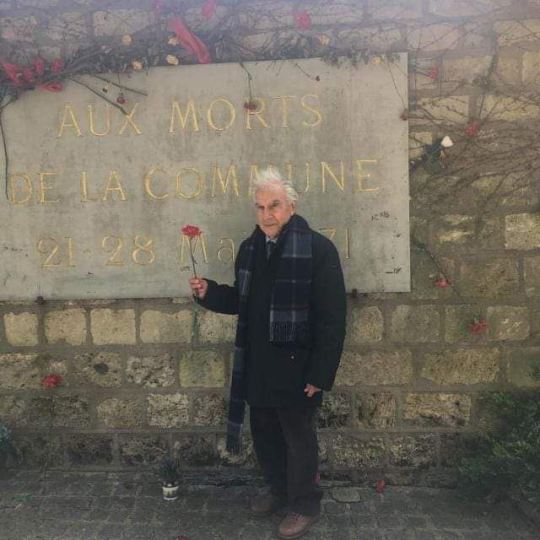#mario tronti
Text
"Hate should never be trusted, nor treated as safe, nor celebrated for its own sake. But, inevitable, it should not be ignored. Nor is it automatically undeserved. Nor, perhaps, can we do without it, not if we are to remain human, in a hateful epoch that pathologizes radical hate and encourages outrage fatigue.
And nor is careful hate necessarily an enemy of liberation. It might be its ally.
In 1837, membership of the radical left group of the great pre-Marxian socialist Auguste Blanqui, known as the 'Seasons,' made such socially informed hate central. Standing against the degradation of the revolutionary tradition, for freedom, acolytes swore an oath: 'In the name of the Republic, I swear eternal hatred to all kings, aristocrats and all oppressors of humanity.'
In 1889, the radical Australian poet Francis Adams wrote that he had destroyed his health in the pursuit of working-class struggle in London. 'It seemed a failure,' he wrote. 'But I never despaired, or saw cause to despair. There was a splendid foundation of hate there. With hate, all things are possible.'
In 1957, Dorothy Counts desegregated a school in North Carolina. Writing of the photograph of her walking past the vicious jeering mob of demonstrators, James Baldwin wrote that '[i]t made me furious. It filled me with both hatred and pity.' The latter for Counts; the former for what he saw in the faces of her attackers. It would be an astonishing and priggish piety to suggest that hatred such as this was unbecoming, or that it did not work for emancipation.
Crucially, as Francis Adams wrote, all things are possible with hate — not only good things. That’s the danger. But some good things, surely, in terms, for example, of activist vigor. Raging, too, certainly, but raging against something, wishing its eradication. The very absence of a critical mass of hatred may militate against resistance: Walter Benjamin, in his extraordinary, prophetic, controversial 1940 essay 'Theses on the Philosophy of History,' took social democracy, as opposed to militant socialism, to task for its focus on the future and on the working class as 'redeemer,' thus actively weakening that class by directing its eyes away from the iniquities of the past and present, to 'forget both its hatred and its spirit of sacrifice.' It was in part in this hatred that he thought there might be strength.
And hate may help not only with strength but intellectual rigor, and of analysis, too. The very flat abstractions of capital can generate their own seemingly implacable logic, against which an emotionally invested, a hating contrary eye, might prove necessary not only ethically but epistemologically.
'What will never function is the cold logic of reason,' Mario Tronti writes, 'when it is not moved by class hatred.' Because 'knowledge is connected to the struggle. Whoever has true hatred has truly understood.' Tronti goes so far as to describe a radical antinomianism, that is, opposition to 'the entire world of bourgeois society, as well as deadly class hatred against it' as 'the simplest form of Marx’s working-class science.' Even in Marx’s early political writings, from 1848–9, wrong as they were in various particulars, Tronti finds 'a clear-sightedness in foreseeing future development such as only class hatred could provide.'"
- China Miéville, from "China Mieville on Why Capitalism Deserves Our Burning Hatred." Jacobin, 27 November 2022.
#china miéville#quote#quotations#activism#politics#leftism#progressivism#marxism#democratic socialism#class struggle#james baldwin#auguste blanqui#francis adams#mario tronti#walter benjamin#oppression#inequality#capitalism
53 notes
·
View notes
Text

This is so fucking catty, but also kind of hard to argue with tronti here?
0 notes
Text

#las furias#tres#son 3#las furias posts#legends#Etienne Balibar#Antonio Negri#Mario Tronti#la era dorada de la filosofía política
0 notes
Text
E' morto Mario Tronti
Partì dall’illuminante “Operai e Capitale”, ha chiuso nel PD, votando il Jobsact di Renzi. Posso immaginare gli elogi funebri: da morti diventiamo tutti padri e madri esemplari. Ciò che spesso non fummo da vivi. Mi chiedo che farei se stessi scrivendo una biografia di Tronti e all’ultimo capitolo mi toccherebbe spiegare il voto per il Jobsact.Prima di cercare una giustificazione, comunque…

View On WordPress
0 notes
Text
“We have to be careful not to represent spirituality as a kind of 'inner well-being', in short, self-care to find harmony with the world … I want to be clear: being at peace with oneself, today, means going to war with the world.”
Mario Tronti
118 notes
·
View notes
Text
3 notes
·
View notes
Text
in June 1848 (that fateful month, a thousand times cursed by the bourgeoisie), and possibly even earlier, the working class took over the stage, and they have never left it since. In different periods they have voluntarily taken on different roles — as actors, as prompters, as technicians or stage-hands — whilst all the time waiting to wade into the theatre and attack the audience.
- Lenin in England
Mario Tronti has died today, rest in peace
4 notes
·
View notes
Text
Theory is understanding and foresight - even if one-sided - of the process [of capital’s] objective tendency. Politics is the will to invert this process; it is subjective action so that this objectivity is blocked and unable to triumph. Theory is anticipation; politics is intervention.
Mario Tronti, “Tactics = Organisation.”
26 notes
·
View notes
Text
'What will never function is the cold logic of reason', Mario Tronti writes, 'when it is not moved by class hatred.' Because 'knowledge is connected to the struggle. Whoever has true hatred has truly understood.' Tronti goes so far as to describe a radical antinomianism, that is, opposition to 'the entire world of bourgeois society, as well as deadly class hatred against it' as 'the simplest form of Marx's working-class science'. Even in Marx's early political writings, from 1848–9, wrong as they were in various particulars, Tronti finds 'a clear-sightedness in foreseeing future development such as only class hatred could provide'.
Class hatred. Hatred by a social force, of an opposing social force, of that 'dominating other' Steven Shakespeare identifies. Such a hate is just, indicated and necessary: 'not a personal, psychological or pathological hate, but a radical structural hate for what the world has become.'
China Miéville, A Spectre, Haunting: On the Communist Manifesto
11 notes
·
View notes
Text
"With Marxism, and with the workers’ movement, this notion of subjectivity became a collective subjectivity, a social subjectivity, a political one. So, I think that the arc of modernity from the singular subject of the subject-individual to the social subject closes the history of the subject as such. This form of presence in history has entered into crisis. My feeling is that it has opened a different history, the possible developments of which are not yet clear. I have the impression that with the emergence of the working-class, of the proletarian subject, of proletarian subjectivity, the history of modernity and the modern subject, or if we want, of subjectivity, was brought to a close. At this point, as far as I’m concerned, the eruption of the working class seems to be more of an endpoint rather than a starting point for modernity. Of course, this does not diminish the importance of the working class. To the contrary, I think that this exalts the working class: it was the force capable of bringing the long and complex development of modern history to its conclusion. Its defeat brings the idea of the subject into crisis without ushering in another form of subjectivity, but seems rather to point toward the end of subjectivity itself.
The type of world that exists, the dominant social model, has assumed a totalizing form. It has come to occupy all spaces, including all those belonging to the human being, such that purely political responses have become inadequate, as they do not respond to the scope of the problem, which is one of totality. Expanding the anthropological dimensions allows for an expansion of possible responses. It opens new spaces of possibility because this type of world and social form, which has assumed this totality, becomes all the more lamentable and thus refutable. Ethical revolt tells you that you must be against the world in as total a way as the reality in front, above, below, or behind you is… There were strong examples of the internalization of this totality into a single individual, and not only individuals but social subjectivities as well. This process of internalization of the animal spirit of the bourgeoisie, the bourgeoisification of the individual form, also subsumes what little remains of social subjectivity. In the same social subjectivity there is an interiorization of a hostile world, which explains why even collective organizations (made up of individuals) offer the same answers as do individuals. Just as today’s individual surrenders to being just what they are asked to be, i.e., to be bourgeois — if you want to live, and live well, and everyone wants to live well, then you must be bourgeois — collective organizations (the union, the party) also surrender to this imperative. If you want to perform well in this world, then you need to internalize this characteristic of being as you are asked to be. This is what provokes ethical revolt, because there is a process of internalizing what was earlier an external enemy that has now become a more complicated, more dangerous, and more difficult foe.
Today when I think about the state of exception I think of civil war, which is the point at which there is no longer anyone with the capacity to keep a grip on equilibrium. This is why I find so-called pacifist movements to be a bit pathetic. Because the more there is peace, the more there is order, and thus the more there is the capacity for control by those in charge. The only thing that can unhinge this order and this possibility of control is precisely a form of conflict that is so fierce and uncompromising that no one can control it. It’s true that today there is also a use of conflict to instill control; it’s not a coincidence that wars are occurring in the peripheries. We have to think a bit more about the forms of these wars. The form that politics takes at a given moment dictates the corresponding form that war will take. We have to understand this correspondence. This is interesting, because the war is at the margins of global order and at the same time assures that there is order in the center. I don’t know if this has been strategically planned in this way, but it’s a fact that war doesn’t explode in the center of the system anymore.
I’m very interested in what’s happening in Paris. Of course, when I see the explosions of the banlieues I feel happy, because every instance of disruption and disorder is a positive thing. There are many people that aren’t fans of movements because they see only a practice of excessive violence. I instead see them as weak practices: movements don’t have power. And perhaps it’s for this reason that they resort to violence, to gratuitous violence, since violence is always gratuitous. Power is a serious thing, it impacts the great contradictions, it makes itself felt. Power is always organized, thought through, quasi-planned. Struggle only makes an impact when it is organized. Movements need to find their strength. Not a strength based in external politics, but precisely their strength. Movements should become the primary powers of the moment, seeing that political powers have become powerless. Movements should be self-organizing so as to become powerful, not just strong, but powerful. But at the same time, they also need to develop the capacities for longevity and management; I know that this contradicts the very idea of movements, given that once you begin to manage something you also create a form of organization that is no longer a movement. This is an impasse that I myself have not figured out how to resolve.
I really like the idea of destituent power. I think it is a really nice idea. But we have to reason, elaborate, and articulate the discourse a bit, because I think destituent power emerges from the crisis of subjectivity. Subjectivity — especially when it became social subjectivity, whose organization was indeed a possibility and a reality and a practice — was naturally constituent, and a bearer of a positive project. In fact, it linked struggle more to solutions rather than to the reasons for struggle itself. In some sense, this was the logic in which the worker’s movement was trapped, since it often became more about preaching socialism than critiquing capitalism. Put another way, the idea of socialism became more central than the critique of capitalism. If the idea of socialism seem less important to me today, this is because it is possible to make a pure and simple critique of really existing conditions that is strong enough to muster the same capacity for development and mobilization as historical socialism once did. Also because it is not necessary to discern what to do about subaltern classes. The same type of work that we were talking about earlier — fragmented, dispersed, one that is at a completely different level of awareness as compared with traditional work, since we are talking about knowledge work — allows for a more realistic and less ideological discussion. The critique of really existing conditions becomes less messianic and closer to the practice of effective struggle against working conditions rather than about fighting the manager. It is here that the idea of destituent power takes shape. The primacy lies not in building something, but rather in destituting what is already there, to place the existent into crisis. This is an idea that I would insist on.
I’m not sure that democracy is a reproduction organ that is enlarged by the imagination. I see it as a means of reducing the capabilities for human beings’ imagination insofar as the available modes of escaping democracy are relatively few in number, trapping people inside a perpetually unattainable horizon. Then, imagination has other ways of expressing itself, because the world of the market, of consumption, of free time, are all inscribed inside democratic time. Instead, I think that we need to consider the force of imagination in a positive sense, and find a way to recharge — not in the sense of the old idea of ideology, but rather through the deconstruction of ideology — and enlarge life’s horizon of possibilities.
It has been many years now that I have been attempting to reacquaint myself with these territories that had been taken from us by an excess of rationalism (which Marxism also has at its base), in order to reconsider human complexity as something much more difficult to enclose within materialist frameworks. There are various human resources that can be used, and that have been destroyed by, the form of organization proper to modern capitalist society. It is the same type of thought that I’ve been practicing for the last few years, which is an imaginative style of thinking and writing, which is more transversal, allusive, and always seeks to make people think in new ways: not in the style of political economy, whose method replicates the cold calculus of the capitalist market, but in a manner that emphasizes that which is profound in human being. This should be a refrain for social movements: to accuse the world of having reduced the human being to much less than it could be.
It’s so terrific. “The revolution made progress, not by its immediate tragicomic achievements.” I think this is wonderful. To define its immediate achievements as “tragicomic” is the greatest possible critique of reformism. Because everything is reformist: pragmatism, the workers’ movement, and even the Italian communist movement chased after immediate achievements. Defining them as “tragicomic” is extraordinary because that’s exactly what they are. Immediate achievements are ridiculous. The more they are immediate conquests, the more they are tied to the present condition. Immediate conquests will improve the present conditions of work, of life, but they won’t allow you to pass on to other alternative conditions. Rather they lock you inside what you have already achieved. This is the tragedy at the heart of comedy. But Marx continues: “…but by the creation of a powerful, united counter-revolution, an opponent in combat with whom the party of overthrow ripened into a really revolutionary party.” So, the revolutionary process (or what we could call destituent power) thus consists in creating an adversary, in creating a “united counter-revolution.” It’s not about fighting for the revolution, but rather doing it in such a way as to produce a powerful counter-revolution, that, as you struggle against it, it allows you to go beyond the immediate situation. I find this illuminating. The insurrectionary party will only mature when it has a powerful enemy to combat. The movements needed this; instead of a power that immediately represses them, then tolerates them, then learns to control them, they needed to find a great adversary that would have allowed them to grow.
When the open conflict recedes, there will be nothing for everyone to do but go home, and even if it seems like the most advanced solution, we will all fall asleep again and nothing will happen."
3 notes
·
View notes
Text
When Marx criticised the high points of capitalist development, many took him for a reactionary, for he was turning his nose up at the last word in modern history. Marx's reply was simple and unambiguous: ...we are against the present society, but that does not mean that we are for the world of the past. Some today criticise us for the contradiction of mounting a working-class critique of the workers' movement; but Marx's reply equally well answers that objection... Saying no to today's socialism does not mean having to say yes to yesterday's capitalism.
Mario Tronti, 'A Course of Action' from Workers and Capital
0 notes
Text
Antonio Maestre: La coyuntura surgida tras la correlación de fuerzas del 23 de julio no es la mejor para Sumar porque se ha dejado de tener una mayoría de progreso, pero la política consiste en jugar con las cartas que se reparten... El partido no es una ocurrencia de Yolanda Díaz. Es la lógica consecuencia del desgaste del espacio y un intento vano para soportar la caída en un nuevo ciclo político poco propicio para fuerzas de impugnación. Sumar no hubiera nacido sin los errores de Podemos ni la nefasta deriva de sus dirigentes con un desgaste inasumible, nadie hubiera cedido el liderazgo de Unidas Podemos si no fuera porque el sujeto político que lo lideraba estaba amortizado... No es posible la unidad de la izquierda en la coyuntura actual y no hay que perder un segundo más en ese debate... Si algo ha hecho bien Podemos es tener claro su rumbo y actuar acorde a esas motivaciones. Ellos han elegido un camino en solitario y actúan de manera coherente con su decisión
0 notes
Text
La Ceccano dei libri, Bettini presenta l'Atlante della memoria operaia, caffè letterario, 10 aprile, ore 17,30
Si svolgerà mercoledì 10 Aprile alle 17:30 la giornata in memoria del filosofo Mario Tronti a Ceccano presso il caffè letterario Sinestesia a Ceccano. Per l’occasione verrà presentato il libro ” Atlante della memoria operaia ” edito da Derive Approdi, scritto proprio da Tronti e Lorenzo Teodonio. Gli operai hanno agito nella crisi dell’età moderna come i monaci nella crisi dell’età antica:…

View On WordPress
0 notes
